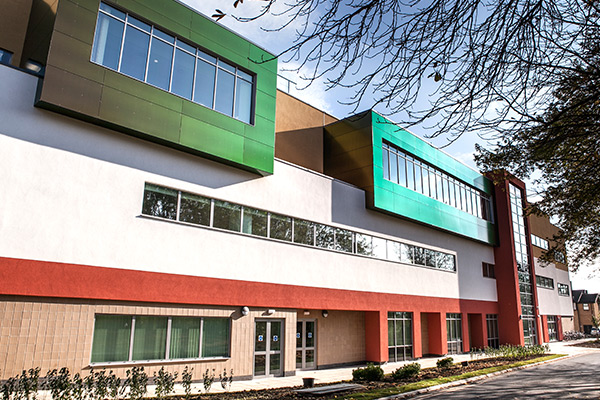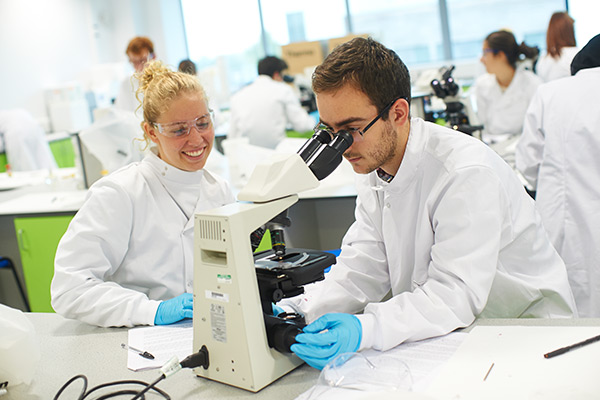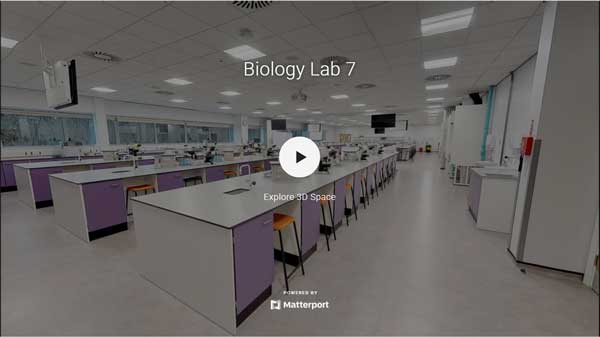View semester dates

MBiol (Hons) Biotechnology
Prepare for a career as a microbiologist or biotechnologist, using research to find out how biotechnology is fundamental to solving disease-related problems and providing food, fuel and medicines.
Year of entry: 2026/27
View semester dates
1st in the Russell Group for 'Academic Support'
7th in the UK for Biology
Our integrated Masters in Biotechnology examines how microorganisms can be used to produce improved therapeutic drugs, and why an understanding of microbial evolution is important for controlling pathogens.
This course is ideal if you want an interdisciplinary approach to Biotechnology. You'll have a wide range of options to tailor the course to your developing interests.
Microorganisms are an important but often overlooked form of life. They are causative agents of many diseases, but can also be harnessed to produce a wide range of useful products including antibiotics and other medicines. Microbes are vital for providing multiple ecosystem services and are crucial for agricultural systems, whether via the microbes in the soil, those associated with plants, or in the context of providing the basis for our understanding of genetic modification. They can be used to produce biofuels, provide the means to decontaminate polluted environments and act as important models for understanding biological processes. At York, you will learn about the practical application of biological knowledge to economically important areas, such as health, food and the environment.
This integrated Masters course specifically focuses on the skills needed for a career as a research scientist. You'll work with researchers in one of the UK’s top bioscience departments to learn specialised techniques. You'll gain experience in a research lab doing pioneering work, undertake specialist research training and take Masters-level modules.
Adding a year in industry or a year abroad are both an option with this course too, so you can benefit from the advantages that a year away can bring. There are also opportunities for paid summer research internships. The Department of Biology will provide you with the opportunity to learn in new, spacious and modern teaching laboratories which provide excellent facilities for practicals and small group project work, alongside our state-of-the-art computing facilities.
Accreditation
This undergraduate course is accredited by the Royal Society of Biology. As a graduate, you will meet in-part the academic and experience requirement for membership and chartered biologist (CBiol).
In one of my 1st Year assessments, we were tasked with solving a current global issue of our choice. This meant we were able to choose a topic that interested us. This was a fun project as it allowed us to be creative but also challenged our problem-solving abilities.
Course content
This is a flexible and modular course which offers you choices in what you can study. There is the option to spend an additional year in industry or a year abroad as part of this course. If you do not go away for a year, you will continue to progress through your studies within the University.
Year 1
Stage 1 (the first year) consists of core modules which are designed to give you an excellent basis on which to build your future studies and develop your interests.
Core modules
- Becoming a Bioscientist: Core Skills
- Life on Earth
- Genetics
- Becoming a Bioscientist: Grand Challenges
- Cells to Organisms
- Molecules of Life
Academic integrity module
In addition to the above you will also need to complete our online Academic Integrity module.
Year 2
Core modules
- Becoming a Bioscientist: Experimental Design and Communication
- Becoming a Bioscientist: Research in Action
- Molecular Biotechnology
Option modules
You will study three option modules. Examples can be found below.
You must choose at least one of the following modules:
You can also choose up to two of the following modules:
- Medical Genetics
- Neuroscience
- The Immune System
- Population Genetics and Evolution
- Ecological Solutions for Global Challenges
- Practical Ecology
- Behavioural Ecology
Some option module combinations may not be possible. The options available to you will be confirmed after you begin your course.
Elective modules
You may be able to replace one option module with an elective module, studying a complementary subject, a language or an interdisciplinary topic.
Year 3
Core modules
Option modules
You will study three option modules. Examples can be found below.
You must choose at least one of the following modules:
- Genomics
- Ageing and Regenerative Medicine
- Molecular Machinery in Action
- Advanced Topics in Gene Expression
- Trends in Microbiology
- Molecular Recognition
You can also choose up to two of the following modules:
- Evolution
- Cancer Cell and Molecular Biology
- Pathogens
- Genetics of Disease
- Advanced Topics in Neuroscience
- Haematology and Immunology in Health and Disease
- Conserving Biodiversity in the Anthropocene
- Current Research in Ecology
- Ecology Field Course
Some option module combinations may not be possible. The options available to you will be confirmed after you begin your course.
Elective modules
You may be able to replace one option module with an elective module, studying a complementary subject, a language or an interdisciplinary topic.
Our modules may change to reflect the latest academic thinking and expertise of our staff, and in line with Department/School academic planning.
Learning outcomes
Every course at York has been designed to provide clear and ambitious learning outcomes. These learning outcomes give you an understanding of what you will be able to do at the end of the course. We develop each course by designing modules that grow your abilities towards the learning outcomes and help you to explain what you can offer to employers. Find out more about our approach to teaching and learning.
Learning outcomes for this course
- Provide systematic explanations that demonstrate a deep understanding of the principles, concepts and theories on the origin, evolution, and distribution of living organisms through critical evaluations of the scientific literature at the forefront of Biological research.
- Formulate hypotheses, design and execute experiments for the collection, analysis and modelling of biological data, that tests the current understanding of biological systems, to produce figures, graphs and tables explained in comprehensive research reports.
- Identify and critically evaluate state-of-the-art experimental, analytical and quantitative techniques and methods through knowledge and by engaging with practical experience in laboratories and the field, providing detailed explanations of how these approaches can be used to tackle the major global challenges in biotechnology of the 21st century.
- Work effectively as an individual, a team member or leader in collaborative groups, by applying logical and critical thinking and reflection to develop creative and innovative solutions to complex problems in biological research, and proactively develop and implement safe, ethical, sustainable and socially responsible solutions that would benefit humankind.
- Communicate and interpret complex information with confidence, clarity and precision through critical reviews in written, oral and other explanations, questioning dogma and thoroughly evaluating the impact of biotechnology research in real-world and global issues, for expert, professional, business, industrial and lay audiences.
- Demonstrate self-direction, originality, creativity, and a critical understanding of cutting-edge practice and technology in biological research, and apply numerical, quantitative, and computer-based transferable skills to a range of working environments including laboratories, fieldwork, education, industry, business, health services, policy, government, and media.
- Specialise in research topics through in-depth critique of the literature, acquisition of advanced data analysis skills, sustained independent investigation of a research question, developing interdisciplinary research proposals to solve global challenges and reflecting on their own and other's research processes and approaches.
Fees and funding
The fees and funding information here is for students starting in the 2026/27 academic year.
If you take a year abroad or year in industry you'll pay a reduced rate of fees for that year.
Annual tuition fees
| UK (home) | International and EU |
|---|---|
| £9,535 (TBC) | £32,350 |
The UK government has announced its intention to increase tuition fees from £9,535 to £9,790 for the 2026/27 academic year. We expect this to apply to new UK (home) undergraduate students starting their studies in September 2026.
UK (home) or international fees?
The level of fee that you will be asked to pay depends on whether you're classed as a UK (home) or international student. Check your fee status.
Fees for subsequent years
- UK (home) fees may increase within the government fee cap in subsequent academic years. We will notify you of any increase as soon as we can.
- International fees are subject to increase in subsequent years in line with the prevailing Consumer Price Index (CPI) inflation rate (up to a maximum of 10%).
More information
For more information about tuition fees, any reduced fees for study abroad and work placement years, scholarships, tuition fee loans, maintenance loans and living costs see undergraduate fees and funding.
Additional costs
Text books and course books are all available in the library or online. We do recommend books you might find useful, reading lists are provided to you when you start your modules, but it is not compulsory for you to buy the books.
Costs for students going abroad or into industry will vary depending on what sort of placement it is and what sort of financial assistance is available.
Optional residential field trips away from York may incur a financial contribution. These additional costs may range from approximately £300 to £900, depending on the destination. A York-based alternative field course will be available at no added cost. All field courses meet the same or matching academic objectives.
Funding
We'll confirm more funding opportunities for students joining us in 2026/27 throughout the year.
York, Oxford, Cambridge, Imperial
Just four UK universities are rated Gold for teaching and top ten for research* in the latest national assessment exercises.
* Awarded joint 10th in the Times Higher Education ranking of the Research Excellence Framework 2021.
Teaching and assessment
You’ll study and learn with academics who are active researchers, experts in their field and have a passion for their subjects. Our approach to teaching will provide you with the knowledge, opportunities, and support you need to grow and succeed in a global workplace. Find out more about our approach to teaching and learning.
Teaching format
Teaching is delivered by academic scientists with additional contributions from clinical researchers. Throughout your course there will be strong links between your studies, scientific research and clinical applications. Our approach to teaching will provide you with the knowledge, opportunities and support you need to grow and succeed in a global workplace. You may be taught by the following methods:
Small-group teaching
Cutting-edge research informs all our teaching activities and our friendly, approachable, and accessible staff are experts in their respective fields. Small-group teaching is an important part of our course, in tutorials, skills-based and research project modules and in taught modules with group work elements. This approach helps develop your scientific writing, problem solving and communication skills, as well as being a great opportunity to have informal scientific discussions with members of staff about topical issues.
Lectures
You will attend lectures where we will deliver stimulating and thought-provoking perspectives on the major global challenges in biosciences of the 21st century.
Practicals
Practicals are designed to help you to develop laboratory skills and to become familiar with a wide range of practical techniques, training you to use methods precisely and encouraging you to objectively assess the reliability of your results.
Workshops
Workshops are also an important feature of our programme, and they provide an additional dimension to most modules. You will often collaborate in small groups in problem solving and other learning activities in our flexible learning workshops. You will design your own experiments and work together on the findings from the latest research papers, or investigate the application of new technologies to the global challenges in the field.
Field courses
Several modules available offer the chance to study outside undertaking field courses. In past years we’ve offered opportunities to study coastal biology environments and colourful flora and fauna in locations around the UK.
Skills and group work
Each semester during the first two years, students take modules designed to develop more generic scientific and transferable skills. Some modules focus on specific scientific techniques, while others develop skills in problem solving, experimental design and data analysis.
We encourage you to develop important communication skills, including working in groups to plan and carry out experiments that investigate a scientific problem, and you will present your work as an oral presentation or poster.
What the integrated Masters year looks like
The final year of an integrated Masters focuses on research. Much of the time, about four days of the week, is spent on your own research project. The rest of the week is spent hearing about research in seminars and journal clubs, writing about research and working in groups on research grant applications.
Timetabled activities
In your first year, you can expect:
| Lectures | 3-5 hours per week |
|---|---|
| Workshops | 4-6 hours per week |
| Practicals | 3-6 hours per week |
| Small-group teaching | 5 hours per semester |
These figures are representative of a typical week. Your contact hours will vary throughout the year due to your module choices, non-compulsory classes, exam periods and changes to scheduled activities.
Outside your timetabled hours, you'll study independently. This may include preparation for classes, follow-up work, wider reading, practice completion of assessment tasks, or revision.
In the UK, full-time students are expected to spend 1,200 hours a year learning. That's about 40 hours of classes and independent study each week during semesters. Everyone learns at a different rate, so the number of hours you spend on independent study will be different to other students on your course.
Facilities
Teaching and learning in the Department of Biology is based in a £23m state-of-the-art facility, which is equipped with laboratories, a flexible workshop and creative learning lounge, computer rooms, specialist tissue culture and fluorescence microscopy suites.
Our teaching labs are equipped with a range of biological techniques that you could engage with while studying your degree including polymerase chain reaction, gel electrophoresis, immunofluorescence microscopy, cell culture and flow cytometry.
Teaching location
This course is based in the Department of Biology which is on Campus West. The majority of teaching takes place within Biology, with some additional teaching taking place at other locations on Campus West.
About our campus
Our beautiful green campus offers a student-friendly setting in which to live and study, within easy reach of the action in the city centre. It's easy to get around - everything is within walking or pedalling distance, or you can use the fast and frequent bus service. Take a campus tour.
Assessment and feedback
You will be assessed via a mixture of closed exams, online open exams and continuous assessment. Although you must perform to a satisfactory level, Stage 1 (which is your first year) does not count towards the final degree, which is determined by work in Stage 2 (25%), Stage 3 (37.5%) and Stage 4 (37.5%). If you undertake a year abroad or in industry this is marked by pass/fail.
Throughout your course we will provide you with feedback on your work and assignments, which will give you an indication of the progress you are making in your studies.
Careers and skills
A degree in biosciences provides an excellent basis for science or health-related careers, and for a wide range of other occupations and professions from management and finance, to journalism and teaching.
Studying biosciences at Masters level will develop your critical thinking and research skills, and prepare you to be competitive for entry into relevant postgraduate degree courses, and in particular PhD study.
Employment opportunities are diverse: ranging from biological and biomedical research and development, to careers in science communication, the health service, forensic science, environmental health and wildlife conservation. Our graduates are not confined to science-related careers, and a significant number enter jobs within finance, public and private sector management, social and health service work, the media and law.
Career opportunities
- Experimental officer
- Research analyst
- Graduate purchaser
- Business development executive
- Ecological consultant
- Accountancy
- Laboratory technician
- Clinic coordinator
- Data manager
- Postgraduate study
- PhD
- Medical writer
Transferable skills
- Problem solving
- Communication skills
- Teamworking skills
- Critical and analytical thinking
- Data interpretation and presentation
- Independent study skills
- Logical and critical thinking
- Creativity and innovation
- IT literacy
- Research skills
Entry requirements
| Qualification | Typical offer |
|---|---|
| A levels | AAA including Biology and a second science We accept the following subjects as a second science: Chemistry, Computer Science, Environmental Science, Further Mathematics, Geography, Geology, Mathematics, Physical Education, Physics, Psychology or Statistics. |
| Access to Higher Education Diploma | 39 credits at Distinction and 6 credits at Merit or higher. Must include Level 3 modules in Biology and a second science. Please contact us for information on the units we accept. |
| BTEC National Extended Diploma | BTEC National Extended Diploma DDD. We consider BTEC Level 3 Extended Diploma in Applied Science (2016 syllabus) with all 7 mandatory units. We consider BTEC Level 3 Extended Diploma in Applied Science (2010 syllabus), please contact us for information on the units we accept. |
| European Baccalaureate | 85% overall including 8.5 in Biology and a second science or mathematics subject. |
| International Baccalaureate | 36 points including 5 in Higher Level Biology plus either 5 in another Higher Level science or mathematics subject, or 5 in two Standard Level science or mathematics subjects. We accept the following IB subjects as a second science: Chemistry, Computer Science, Environmental Systems and Societies, Geography, Mathematics (A&A or A&I), Physics, Psychology, Sports, exercise and health science |
| T levels | We are currently not accepting T Levels for this course unless additional A Levels (or equivalent qualifications) in Biology and a second science or mathematics subject have been taken. |
| Scottish Highers / Advanced Highers | Advanced Highers - AB in Biology and a second Science/Mathematics plus Scottish Highers - AB We may also be able to consider three Advanced Highers or a combination of Highers and Advanced Highers, where an applicant does not meet the grade requirement through Highers alone. Please contact us to discuss your qualifications. |
| International foundation programme | Foundation Certificate from our International Pathway College or an appropriate alternative. |
| Other qualifications | To secure a place as a mature student on this course you will need recent qualifications in Biology and another science at a sufficiently advanced level, together with evidence of some of the key skills needed for studying at degree level. |
| Other international qualifications | Equivalent qualifications from your country |
Alternative offers
Meeting the following additional criteria may qualify you for an alternative offer.
| Criteria | Adjustment |
|---|---|
| Widening participation | BBB including Biology and a second science. This is conditional upon successful completion of the WP programme including the YorJourney module (Black Access Programme, Next Step York) or successful completion of Realising Opportunities More about widening participation. |
| Contextual offer | ABB including Biology and a second science. |
| EPQ | If you achieve B or higher in the EPQ, you may be eligible for an alternative offer up to one A level grade (or equivalent) below our typical offer. |
| Core Maths | If you achieve B or higher in Core Maths, you may be eligible for an alternative offer up to one A level grade (or equivalent) below our typical offer. |
| MOOCs | If you successfully complete our online course Bugs, brains and beasts, you may be eligible for an alternative offer up to one A level grade (or equivalent) below our typical offer. Details about how to evidence completion of the MOOC will be sent in your offer letter. Please note: you do not need to pay for the certificate. More about MOOCs. |
English language
If English isn't your first language you may need to provide evidence of your English language ability. We accept the following qualifications:
| Qualification | Minimum requirement |
|---|---|
| IELTS (Academic) | 6.5, with a minimum of 6.0 in each component |
| IB English | A score of 4 in English A or 5 in English B (Higher Level or Standard Level) |
| Cambridge CEFR | 176, with a minimum of 169 in each component |
| Oxford ELLT | 7, with a minimum of 6 in each component |
| Oxford Test of English Advanced | 136, with a minimum of 126 in each component |
| Duolingo | Integrated subscores: 120 overall, with a minimum of 105 in each component |
| GCSE/IGCSE/O level English Language (as a first or second language) | Grade C / Grade 4 |
| LanguageCert SELT | B2 with a minimum score of 33/50 in each component |
| LanguageCert Academic | B2 with a minimum score of 33/50 in each component |
| Kaplan Test of English Language | 478 Main Flight score with 444 in each component |
| Skills for English | B2: Merit overall, with Pass with Merit in each component |
| PTE Academic | 61, with a minimum of 55 in each component |
| TOEFL | 87 overall, with a minimum of 21 in each component (taken before January 2026) 4.5 with 5 in Listening and 4.5 in each other component (taken after January 2026) |
| Trinity ISE III | Merit in all components |
| Other English language qualifications | We also accept other English Language qualifications, including various school-leaving certificates. |
For more information see our undergraduate English language requirements.
If you haven't met our English language requirements
You may be eligible for one of our pre-sessional English language courses. These courses will provide you with the level of English needed to meet the conditions of your offer.
The length of course you need to take depends on your current English language test scores and how much you need to improve to reach our English language requirements.
After you've accepted your offer to study at York, we'll confirm which pre-sessional course you should apply to via You@York.
Next steps
Contact us
Get in touch if you have any questions
Discover York









